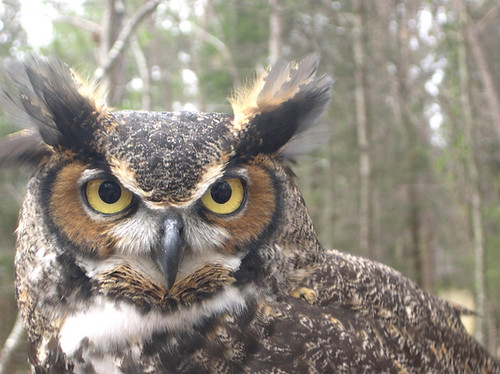
| Submit your comments on this article |
| -Short Attention Span Theater- |
| A little bird told me⊠|
| 2005-06-25 |
| An untrained ear may hear only "chick-a-dee-dee-dee-dee-dee." To a tiny black- capped chickadee, though, the call could be loosely translated as, "Yikes! Get a load of that pygmy-owl! I'll need the whole flock to help drive it away!" The chickadee's familiar call, new research has concluded, varies with the size of a potential predator, influencing the number of recruits joining forces to mob it and send it packing. Except, of course, for the ANSWER types⊠Larger predators such as great horned owls are apparently deemed lesser threats to the petite songbirds because of their ungainliness, the study found. But more nimble predators such as northern pygmy-owls can lead sentinel chickadees to repeat the "D" note or syllable of their calls - essentially a plea for reinforcements. "Certainly, what we're seeing is one of the most sophisticated alarm call systems that's been discovered," said Christopher Templeton, a University of Washington graduate student who completed the research for his masters thesis at the University of Montana. A thesis based in fact! Of course, it's Montana and a reality-based field⊠Chickadees actually have several calls at their disposal. A "seet" call warns of danger in the air, while the "chick-a-dee" call, depending on the context, can cue other birds about food, identity or predators that have perched too close for comfort. The vigilant songbirds also have proven adept at recruiting a host of other species. In the wild, their warning call has summoned everything from warblers and nuthatches to sparrows and small woodpeckers flying to mob a predator - likely acts of self-preservation. For the study, published in this week's issue of the journal Science, Templeton and two co-authors worked with a raptor rehabilitator, giving them access to a range of predators - and the surprising variation in chickadee calls. When the researchers played back a recorded chickadee call made in response to a great horned owl, only part of a captive flock of six flew toward a hidden speaker. But when the scientists played back a longer call with more D notes, made in response to a northern pygmy-owl, "basically the whole flock comes right to the speaker and gets really agitated." Ken Yasukawa, a biology professor at Beloit College in Beloit, Wis., said researchers have discovered a whole range of alarms in animals such as Africa's vervet monkeys, whose cough-like "eagle alarm" sends those within earshot running for cover in bushes, while a barking "leopard alarm" spurs them up a tree. Yasukawa said he welcomes Templeton's study, which he hopes will spur more interest in lesser-known avian alarms. Yasukawa's own study subjects, male red-winged blackbirds, seem to switch among a repertoire of calls with increasing speed and intensity as a threat approaches. Field researchers who trigger this "Geiger counter" effect, in fact, use it to locate their guarded nests. "It's like playing hotter-colder when you're a kid," he said. |
| Posted by:Korora |
| #4 I saw a falconer performing with various birds: falcon, hawk, eagle and owl. Of all of them he said the owl was far and away the dumbest and hardest to train. |
| Posted by: xbalanke 2005-06-25 20:46 |
| #3 I listened to this twits twattle. This seems to be what the Acedemia deem "Important Research". We are in deep doodoo, acedemically. |
| Posted by: Deacon Blues 2005-06-25 18:58 |
| #2 Yes, I do love a righteous great horny owl. |
| Posted by: Shipman 2005-06-25 18:52 |
#1 Ungainly? I'd watch my 6 ifn I wuz you. |
| Posted by: Pissed off Owl 2005-06-25 15:54 |